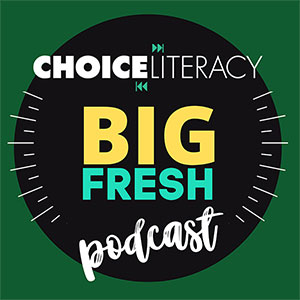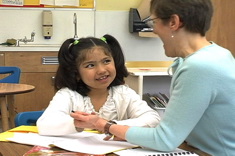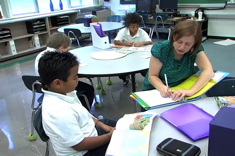In this podcast, Franki Sibberson chats with Patrick Allen (author of Conferring: The Keystone of Reader's Workshop) about how teachers can develop conferring skills. You can follow Patrick's blog, All-en-A-Day's Work, at:
http://all-en-a-days-work.blogspot.com/
A full transcript of the podcast is available below the player.


Franki Sibberson: Patrick, you're an expert in conferring with students about their reading and writing. How did you become so skilled at conferring, and what are the tricks to becoming skilled at conferring?
Patrick Allen: Well, I don't know that I'm an expert, but I do enjoy it. I think it's just something that you know I've come to find is just like the stronghold of my readers' workshop. I love the power that it gives kids; I enjoy it. I love sitting down reader-to-reader, talking. To me, I think it's just such an authentic way to get to know a reader, and I think that's why I spent all this time learning how to do it. I've watched others, I've dug in, I've practiced. I've recorded myself doing reading conferences and watched them. So it's just something that I think we as teachers need to get better at, and that's exactly what I did.
Franki Sibberson: And that's what you'd suggest that other teachers do? Can you talk for a minute about the taping yourself?
Patrick Allen: I think to become stronger at conferring we need to watch ourselves do it. I think that we need to invite someone in to watch our reading conferences, to give us feedback. I think we need to set our iPods down next to us as we confer, and listen to our reading conferences. When I was writing my book, I literally listened to 75 reading conferences in the car, and learned so much just about who I was as the conferrer, and you know, what amount of time I should talk and what amount of time I should listen. So I think we just need to practice and listen and get comfortable and dig in.
Franki Sibberson: Okay. Why do you think conferring is so critical to student learning?
Patrick Allen: I think conferring is critical to student learning because it provides feedback in an authentic context for learners. It's in the moment. You're sitting there reader-to-reader at that time, and students wanna know that we care about them not only as learners, but as readers. And I think it's one of those times that we can actually do that; that we can capture things in the moment. It doesn't come later. I think that it helps students realize that that time that they're going out to spend in text is helping them grow, and that we're gonna be there right alongside them to help them grow.
Franki Sibberson: What are the key things for teachers to remember when conferring?
Patrick Allen: I think, first and foremost, we need to relax. We need to take time to learn to do it well and often, and I love the Katie Wood Ray quote about "think about a time that someone sat down next to you to talk to you about your writing." I think we can take the same thing into reading. Many of us, that didn't happen, so we need to relax and realize that we're actually there now for kids, one-on-one, sitting next to them, conferring. I think that something we need to do is to develop a structure that works for both the reader and for us as the teacher.
The time that I put into developing a structure that my conferences follow — which I call the RIP format in the book — I think that just having a structure to conferences really helped me realize that it was more than just sitting down and having a conversation. I think we have to learn to listen. I think that the idea of eye contact and sincerity and eliminating all of those distractions that are around us is critical. I think — well, I said I think we need to practice; I think it's important for teachers to practice to get better at it, to not give up. And I think that you have to learn to document your conversation, and realize the power of the data you gather, because it's really data about children. It's there.
And I think, if we do it wisely, it's documentable data that can be used as interventions, as a record of who that child is becoming as a reader.
Franki Sibberson: Great. How do you balance student needs in a conference with goals that you have as a teacher?
Patrick Allen: I think it's about looking for that balance, that sometimes — you know, if you know your readers, because you've been conferring with them, because you've been having conversations with them outside the context of readers' workshops, because you've been watching them during times of instruction, you know what those needs and those strengths are. I think you have to know your curriculum. I think you have to know your standards. And I think you have to look for those opportunities that emerge to provide instruction within a conference.
Whether it's a deep structure system, whether it's a surface structure system, it's about finding that balance, and making your reading conferences purposeful.
Franki Sibberson: When you talk about conferring, what are you most passionate about — what are the most important things when it comes to conferring?
Patrick Allen: I think the passion, for me, comes from that idea of giving students that understanding that when you say to them, "So, what do you think," that you really care what they think; that it's a perfect time to cultivate rigor, to nurture inquiry, to develop intimacy. Those are all things I wrote about in the book, and I think that what makes me bring passion to my reading conferences is that's what I do. It's that idea of grappling with all the complexities of what it means to be a reader. There are challenges, there's triumphs, sometimes surprises, that conferring with a reader brings out, and sometimes we miss those things if we aren't sitting down one-on-one with learners that we're in charge of.








